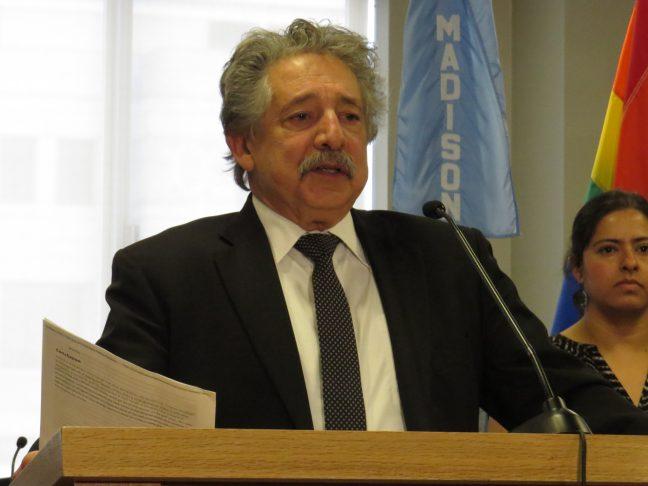A recent press release from the city of Madison formally announced Mayor Paul Soglin’s appointment of Stacie Reece, the city’s first Sustainability Coordinator.
The position entails developing Madison’s sustainability programs and promoting initiatives that increase the use of renewable resources, according to the press release.
One example is Madison’s 100 percent Renewable Energy Zero Net Carbon Plan, which involves sourcing more renewable energy for the city’s grid, as well as evaluating the city’s transportation footprint and converting to electric vehicles.
The City of Madison recently applied for and received a grant from the Office of Energy Innovation, Wisconsin’s state energy office.
The grant will fund the purchase of 20 plug-in electric vehicles to replace aging city fleet sedans, according to the OEI. Madison Gas and Electric will also partially support the electrification of the city fleet by volunteering funds to cover the cost of chargers.
Currently, the city gets the majority of its energy from MGE. Though the company gets only 12 percent of its energy from renewable sources as of 2016, it has been making progress in solar and wind departments.
According to MGE’s website, the company bought a wind farm — with operations slated to begin in 2019 — and brought a Shared Solar Pilot Project for Middleton online in early 2017.
Tom Eggert, senior lecturer at the University of Wisconsin Nelson Institute for Environmental Studies, believes Madison has done a lot of work over the years on making city operations more sustainable.
“The city has a long history of using sustainability to change things,” Eggert said. “Over the last ten years the focus has been on city operations — buildings, operation of those buildings, purchasing decisions, city decisions. Not so much what’s happening in the rest of the city.”
Part of Reece’s job involves not only working with energy companies in Madison but also working with community members.
The city has more than 70 committees that citizens volunteer to be members of, one of which is the Sustainability Madison committee, Reece said.
Sustainability Madison is currently drafting the city’s energy plan, a response to a resolution passed in 2017 for the city to achieve net zero carbon emissions, Reece said.
Reece is also looking to ramp up the city’s MadiSUN Solar Energy Program, a program that allows Madison residents to make group purchases of rooftop solar panels in order to lower the cost for each individual, while also offers loans and financing situations like tax credits.
Reece also plans to work toward providing solar incentives for Madison businesses.
“It’s a much broader stakeholder group that we will be engaging with,” said Reece. “The commercial sector, the central sector, nonprofits, houses of worship — we did set out to include the entire Madison community.”
Other projects on Reece’s list include fast-tracking solar permits, reviewing Madison city policies and practices, establishing a revolving fund for green projects and electric vehicle infrastructure.
Reece cited “mileage anxiety” as a reason that many individuals are wary of purchasing electric cars: If someone doesn’t know whether or not they have enough battery to drive to the closest charging port, it can make owning an electric vehicle difficult.
Through her position, Reece wants to look into how Madison can better support those with electric vehicles and reduce mileage anxiety.
Reece was previously in the private sector for more than ten years, and her most recent position was with Sustain Dane, helping businesses to reduce their carbon footprints.
Reece cited “An Inconvenient Truth,” a 2006 film featuring Al Gore and his urgent warning about climate change, as a “big eye-opener” in regard to her mindset about sustainability practices. It inspired her to go back to school for sustainability management.
When she was still working in the private sector, a conversation with a coworker about fluorescent light bulbs snowballed into a grander sustainable vision.
“I realized that I had an opportunity to really get out there,” Reece said.


